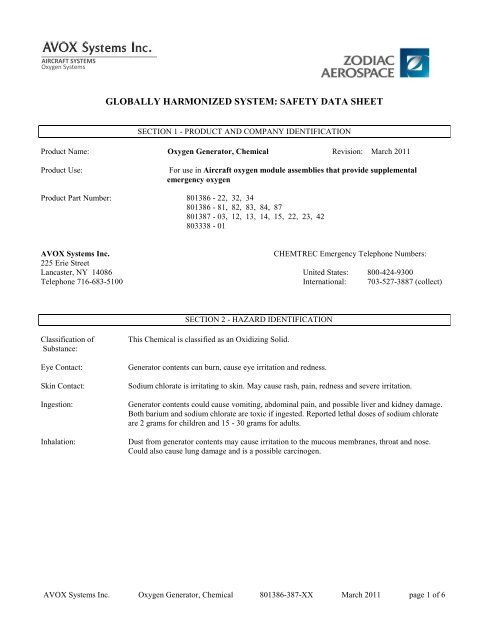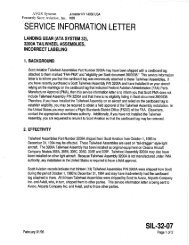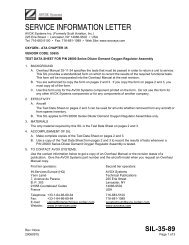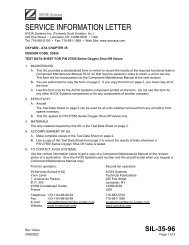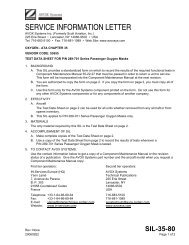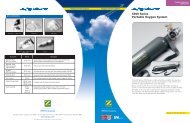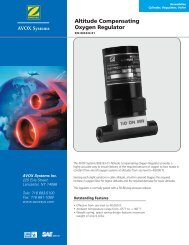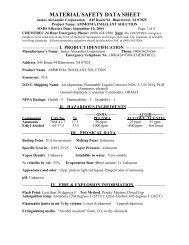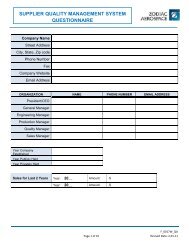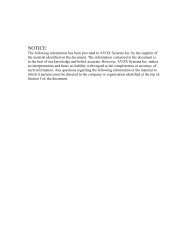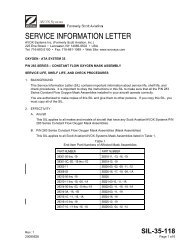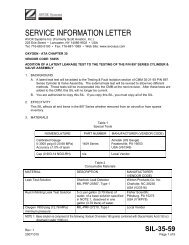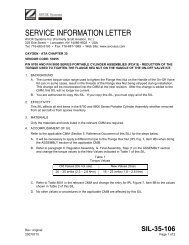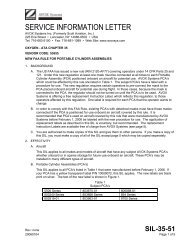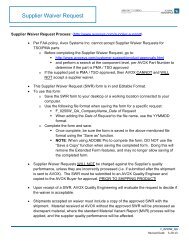Oxygen Generator - Douglas Type MSDS - AVOX Systems, Inc.
Oxygen Generator - Douglas Type MSDS - AVOX Systems, Inc.
Oxygen Generator - Douglas Type MSDS - AVOX Systems, Inc.
You also want an ePaper? Increase the reach of your titles
YUMPU automatically turns print PDFs into web optimized ePapers that Google loves.
___________________________________<br />
AIRCRAFT SYSTEMS<br />
<strong>Oxygen</strong> _____________________<br />
<strong>Systems</strong><br />
GLOBALLY HARMONIZED SYSTEM: SAFETY DATA SHEET<br />
SECTION 1 - PRODUCT AND COMPANY IDENTIFICATION<br />
Product Name: <strong>Oxygen</strong> <strong>Generator</strong>, Chemical Revision: March 2011<br />
Product Use:<br />
For use in Aircraft oxygen module assemblies that provide supplemental<br />
emergency oxygen<br />
Product Part Number: 801386 - 22, 32, 34<br />
801386 - 81, 82, 83, 84, 87<br />
801387 - 03, 12, 13, 14, 15, 22, 23, 42<br />
803338 - 01<br />
<strong>AVOX</strong> <strong>Systems</strong> <strong>Inc</strong>.<br />
CHEMTREC Emergency Telephone Numbers:<br />
225 Erie Street<br />
Lancaster, NY 14086 United States: 800-424-9300<br />
Telephone 716-683-5100 International: 703-527-3887 (collect)<br />
SECTION 2 - HAZARD IDENTIFICATION<br />
Classification of<br />
Substance:<br />
Eye Contact:<br />
Skin Contact:<br />
Ingestion:<br />
Inhalation:<br />
This Chemical is classified as an Oxidizing Solid.<br />
<strong>Generator</strong> contents can burn, cause eye irritation and redness.<br />
Sodium chlorate is irritating to skin. May cause rash, pain, redness and severe irritation.<br />
<strong>Generator</strong> contents could cause vomiting, abdominal pain, and possible liver and kidney damage.<br />
Both barium and sodium chlorate are toxic if ingested. Reported lethal doses of sodium chlorate<br />
are 2 grams for children and 15 - 30 grams for adults.<br />
Dust from generator contents may cause irritation to the mucous membranes, throat and nose.<br />
Could also cause lung damage and is a possible carcinogen.<br />
<strong>AVOX</strong> <strong>Systems</strong> <strong>Inc</strong>. <strong>Oxygen</strong> <strong>Generator</strong>, Chemical 801386-387-XX March 2011 page 1 of 6
GHS LABEL ELEMENTS:<br />
<strong>Oxygen</strong> <strong>Generator</strong>, Chemical<br />
(Sodium Chlorate, Potassium Perchlorateoxidizers)<br />
Danger:<br />
May intensify fire; oxidizer.<br />
<strong>AVOX</strong> <strong>Systems</strong>, <strong>Inc</strong>.<br />
225 Erie Street<br />
Lancaster, NY 14086<br />
Telephone 716-683-5100<br />
SECTION 3 – COMPOSITION / INFORMATION ON INGREDIENTS<br />
Contents of <strong>Generator</strong> CAS # EC # WGT %<br />
Sodium Chlorate 7775-09-9 231-887-4 Less than 90<br />
Barium Peroxide 1304-29-6 215-128-4 Less than 7<br />
Potassium Perchlorate 7778-74-7 231-912-9 less than 2<br />
Iron Powder 7439-89-6 231-096-4 less than 7<br />
Silicon Dioxide 14808-60-7 238-878-4 less than 5<br />
Titanium Dioxide 13463-67-7 236-675-5 less than 3<br />
Mica 12001-26-2 Not available less than 2<br />
Magnesium Oxide 1309-48-4 215-171-9 less than 0.2<br />
Talc 14807-96-6 238-887-9 less than 0.2<br />
Iron Oxide 1309-37-1 215-168-2 less than 0.1<br />
Listed as IARC Carcinogen: silicon dioxide<br />
Listed as NTP Carcinogen: silicon dioxide, talc, quartz<br />
OSHA Carcinogen: none<br />
<strong>AVOX</strong> <strong>Systems</strong> <strong>Inc</strong>. <strong>Oxygen</strong> <strong>Generator</strong>, Chemical 801386-387-XX March 2011 page 2 of 6
SECTION 4 - FIRST AID MEASURES<br />
Inhalation:<br />
Skin Contact:<br />
In the event of contact with the generator contents, avoid breathing excessive dust. Remove to fresh air at<br />
once. If not breathing give artificial respiration and call emergency responders.<br />
In the event of contact with the generator contents, wash affected area with soap and water. Get medical<br />
attention if irritation occurs.<br />
Eye Contact: In the event of contact with the generator contents, flush eyes with a directed stream of water for at least 15<br />
minutes. Forcibly hold eyelids apart to ensure complete irrigation of all eye and lid tissue. Get medical<br />
attention if irritation occurs.<br />
Ingestion:<br />
Contact physician immediately.<br />
SECTION 5 - FIRE FIGHTING MEASURES<br />
Flash Point: not applicable Flash Point Method: not applicable<br />
Flammable Limits: not applicable Autoignition Temperature: not applicable<br />
Unusual Fire & Explosion Hazards:<br />
Special Firefighting Procedures:<br />
<strong>Generator</strong>s contain oxidizers. Oxidizers generate their own oxygen as they burn<br />
and therefore cannot be extinguished by means other than water. Do not use<br />
CO2 or dry extinguishers as they are ineffective and may create a worse<br />
situation. Contact between the generator contents and other materials may cause<br />
fire.<br />
Avoid bodily contact. Wear self contained breathing apparatus and wear<br />
appropriate protective equipment. Keep material from exposure to high heat by<br />
using water to cool containers.<br />
SECTION 6 - ACCIDENTAL RELEASE MEASURES<br />
Steps To Be Taken In Case Material Is Released Or Spilled:<br />
Loose chemicals and components should be carefully placed<br />
into a dry metal container. Vacuuming or wet sweep may be<br />
used to avoid dust dispersal. Be sure to wear appropriate PPE<br />
while conducting clean up. If an amount spills that is too<br />
large for local clean up, call HAZMAT responders<br />
immediately.<br />
SECTION 7 - HANDLING AND STORAGE<br />
Storage Temperature & Pressure:<br />
General:<br />
Store the generators in a well ventilated, dry area at normal ambient temperature<br />
and pressure.<br />
Do not store in wet or moist environments. Keep generators in manufacturer’s<br />
original packaging when not in use. Practice good housekeeping techniques.<br />
<strong>AVOX</strong> <strong>Systems</strong> <strong>Inc</strong>. <strong>Oxygen</strong> <strong>Generator</strong>, Chemical 801386-387-XX March 2011 page 3 of 6
Contents of <strong>Generator</strong><br />
SECTION 8 - EXPOSURE CONTROLS / PERSONAL PROTECTION<br />
Exposure Limits<br />
Exposure Limit/Classification<br />
Regulating Agency<br />
Sodium Chlorate -- None (oxidizer)<br />
Barium Peroxide ACGIH 0.5 mg/m 3<br />
OSHA 0.5 mg/m 3<br />
Iron Powder -- None<br />
Silicon Dioxide ACGIH 0.025 mg/ m 3<br />
OSHA<br />
10mg/ m 3 /( %SiO 2 +2) (Resp)<br />
Titanium Dioxide ACGIH 10 mg/ m 3<br />
OSHA<br />
15mg/ m 3 total dust<br />
Mica ACGIH 3 mg/ m 3<br />
OSHA<br />
20 mppcf<br />
Potassium Perchlorate -- None (oxidizer)<br />
Magnesium Oxide ACGIH 10 mg/ m 3<br />
OSHA<br />
15 mg/ m 3 total dust<br />
Talc ACGIH 2 mg/ m 3<br />
OSHA<br />
20 mppcf<br />
Iron Oxide ACGIH 5 mg/ m 3 fume as Fe<br />
OSHA<br />
10 mg/ m 3 fume<br />
Personal Protection:<br />
When handling the contents of the generator, impervious gloves, a NIOSH approved air<br />
purifying filter respirator, safety glasses/goggles and protective clothing should be worn.<br />
SECTION 9 - PHYSICAL AND CHEMICAL PROPERTIES<br />
Appearance:<br />
A compressed, gray, chemical core enclosed within a metal canister.<br />
Vapor Pressure: not applicable Vapor Density: not applicable<br />
Specific Gravity: varies Evaporation Rate: not applicable<br />
Odor: none Solubility in Water: appreciable<br />
pH: alkaline Flammability: not applicable<br />
UEL: not applicable LEL: not applicable<br />
Viscosity: not applicable Flash point: not applicable<br />
<strong>AVOX</strong> <strong>Systems</strong> <strong>Inc</strong>. <strong>Oxygen</strong> <strong>Generator</strong>, Chemical 801386-387-XX March 2011 page 4 of 6
SECTION 10 - STABILITY AND REACTIVITY<br />
Conditions To Avoid:<br />
<strong>Inc</strong>ompatibility:<br />
Hazardous Decomposition Products:<br />
Hazardous Polymerization:<br />
Stability:<br />
Avoid storing generators with chemicals, acids, ignition sources and<br />
combustible materials. Avoid opening the generator housing. Avoid mixing or<br />
contaminating the contents of the generator with other chemicals, including<br />
acids, and combustible materials. Keep contents of generator away from sources<br />
of friction and ignition sources.<br />
The contents of the generator are incompatible with oils, organic chemicals,<br />
acids and metals including aluminum.<br />
Can include chlorine and chlorine dioxide.<br />
Will not occur.<br />
Stable<br />
SECTION 11 - TOXICOLOGICAL INFORMATION<br />
Acute Toxicity:<br />
Data is not available<br />
Carcinogenicity:<br />
Data is not available<br />
Skin Corrosion/irritation:<br />
Data is not available<br />
Reproductive Toxicity:<br />
Data is not available<br />
Serious Eye Damage:<br />
Data is not available<br />
STOT-Single Exposure:<br />
Data is not available<br />
Respiratory or skin sensitization:<br />
Data is not available<br />
STOT-Repeat Exposure:<br />
Data is not available<br />
Germ Cell Mutatgenicity:<br />
Data is not available<br />
Aspiration Hazard:<br />
Data is not available<br />
SECTION 12 - ECOLOGICAL INFORMATION<br />
No data available.<br />
SECTION 13 - DISPOSAL CONSIDERATIONS<br />
<strong>Generator</strong>s must be spent prior to disposal. Due to barium within the generator it is considered a hazardous waste even after<br />
it is spent. The spent generator must be disposed of in accordance with all Federal, State and local regulations.<br />
<strong>AVOX</strong> <strong>Systems</strong> <strong>Inc</strong>. <strong>Oxygen</strong> <strong>Generator</strong>, Chemical 801386-387-XX March 2011 page 5 of 6
SECTION 14 - TRANSPORTATION INFORMATION<br />
DOT/UN Shipping Name:<br />
<strong>Oxygen</strong> <strong>Generator</strong>, Chemical<br />
DOT/UN Hazard Class: 5.1<br />
DOT/UN Number: UN 3356<br />
Packing Group:<br />
II<br />
Notice: Special Shipping restrictions apply. Refer to United States Code of Federal<br />
Regulations (CFR 49) or other applicable government regulations. Government<br />
approval, exemptions or permits may be required.<br />
SECTION 15 - REGULATORY INFORMATION<br />
This device is a chemical oxygen generator and is classified as an “Article” as defined in 29 CFR 1910.1200 (b) (6) (v) - 1<br />
July 1995. Therefore, this device does not require a Material Safety Data Sheet. However, for Federal procurement, a <strong>MSDS</strong><br />
is required per Federal Standard No. 313C (GSA Federal Supply Service).<br />
SECTION 16 - OTHER INFORMATION<br />
The information contained herein is, to the best of our knowledge and belief, accurate. However, <strong>AVOX</strong> <strong>Systems</strong> <strong>Inc</strong>.<br />
assumes no liability whatsoever for the accuracy or completeness of the information contained herein. Final determination of<br />
suitability of any material is the sole responsibility of the user. All materials may present unknown hazards and should be<br />
used with caution. Although certain hazards are described herein, we cannot guarantee that these are the only hazards which<br />
exist. It is the responsibility of the user to comply with all applicable Federal, State, and Local laws and regulations.<br />
<strong>AVOX</strong> <strong>Systems</strong> <strong>Inc</strong>. <strong>Oxygen</strong> <strong>Generator</strong>, Chemical 801386-387-XX March 2011 page 6 of 6


